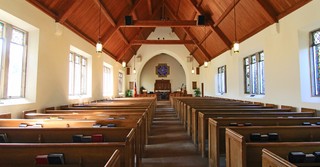4 Powerful Reminders from the Early Church
Share

The book of Acts is an epic and fascinating historical record of the early church. Much of the New Testament was written by Paul the apostle during these times; although the book of Acts itself was written by Luke, and other books have different authors. Acts covers a period of approximately thirty years, and is both thrilling and dramatic. Throughout its pages we are witnesses to the raw emotions of this most turbulent time; the anger, the hatred, the joy, and the boldness of those caught up in the events that would shape the world in which we now live.
The early church endured pain and relentless persecution, but they were a people who had a divine directive, coupled with a promise that they never forgot:
“Therefore go and make disciples of all nations, baptizing them in the name of the Father and of the Son and of the Holy Spirit, and teaching them to obey everything I have commanded you. And surely I am with you always, to the very end of the age” (Matthew 28:19-20).
It would be the Holy Spirit who would empower these very ordinary people, people just like us, to do the miraculous. The book of Acts is in essence, the acts of the Holy Spirit, guiding and using men and women surrendered to the will of God. His power would transform them in ways they never thought possible.
Photo credit: Unsplash/Debby Hudson
Life in the Early Church

“But you will receive power when the Holy Spirit comes on you; and you will be my witnesses in Jerusalem, and in all Judea and Samaria, and to the ends of the earth” (Acts 1:8).
These words would literally come to pass just as spoken here, but that would not be where it would all end. The mantle and mandate given to the early church would be passed on to those who would follow in their steps. We are given a glimpse of life in the early church as we read these verses from Acts:
“They devoted themselves to the apostles’ teaching and to fellowship, to the breaking of bread and to prayer. Everyone was filled with awe at the many wonders and signs performed by the apostles. All the believers were together and had everything in common. They sold property and possessions to give to anyone who had need. Every day they continued to meet together in the temple courts. They broke bread in their homes and ate together with glad and sincere hearts, praising God and enjoying the favor of all the people. And the Lord added to their number daily those who were being saved” (Acts 2:42-47).
In light of the mandate to “Go,” and the promises attached to it, what are some of the lessons that we can take away from the Early Church? Because when we see the results of their efforts, we know one thing for sure — they got it right.
Photo credit: ©Getty Images/monkeybusinessimages
1. We Must Rely upon the Power of the Holy Spirit to Lead Us

The Early Church emphatically depended on the Holy Spirit. They did nothing apart from His leading. If the Spirit said “Go,” they went; if He said “No,” they didn’t — it was that simple. We cite this series of events as proof:
“Paul and his companions traveled throughout the region of Phrygia and Galatia, having been kept by the Holy Spirit from preaching the word in the province of Asia. When they came to the border of Mysia, they tried to enter Bithynia, but the Spirit of Jesus would not allow them to. So they passed by Mysia and went down to Troas. During the night Paul had a vision of a man of Macedonia standing and begging him, ‘Come over to Macedonia and help us.’ After Paul had seen the vision, we got ready at once to leave for Macedonia, concluding that God had called us to preach the gospel to them” (Acts 16:6-10).
The apostles of the Early Church were sold out to the voice of the Spirit. There will be times as we are doing the will of God that He will redirect us. This redirection should not be seen as a change of His will; in this case, they were still going to preach the gospel. God was just changing their location.
There was a woman named Lydia who needed to hear the word, so they were directed by the Spirit to where she would be. At the same time, there would be a jail cell that would be theirs as they continued — but there would be a jailor there who would need to know how to be saved. Had the disciples not heeded the voice of the Spirit, Lydia would not have gotten saved, and the jailor would have killed himself.
How about us? Are we ready to drop whatever we may be doing, to go where the Spirit leads us? Or would we argue that we are already doing something good where we are? This was the case with the apostles, but because of their sensitivity to His leading, and a desire to be obedient, they went.
Photo credit: Unsplash/Jim Wilson
2. We Must Preach the Gospel and Nothing Else

Without question, the early church understood the power of the gospel of Jesus Christ. They were not trying to tear down the Roman Empire. In fact, they understood that if the Roman Empire were going to be eradicated, it would be through the gospel alone. Paul understood what the gospel was able to do, and he told this to the church at Corinth:
“For the message of the cross is foolishness to those who are perishing, but to us who are being saved it is the power of God” (1 Corinthians 1:18).
“For I determined not to know anything among you, save Jesus Christ, and him crucified” (1 Corinthians 2:2).
If we are to see people saved, then we must preach that which is the only thing that can save — the gospel.
“Consequently, faith comes from hearing the message, and the message is heard through the word about Christ” (Romans 10:17).
When we are sharing our faith with others, our own personal testimony as to the goodness and grace of the Lord can prove to be very valuable, but it is the inclusion of the gospel that makes the difference. We are all saved because of what Christ accomplished on the cross on our behalf. Remember that the gospel is the power of God that leads us to salvation. That's it. There is no other path to salvation except the cross, and keeping this at the center of our ministry, and our lives, is essential.
Photo credit: ©Getty Images/Dangben
3. We Must Adapt to the Intensity of the Times

The adversity and unpredictability of the times no doubt caused much distress and required great consternation. Because of persecution, many times they found themselves on the run; they were forced to other locations and stayed there until they were run out again.
When I speak of adapting, I do not mean that they adapted the message; they themselves had to adapt to new surroundings. Wherever we go, we must take the gospel with us. Times may change, laws may change, we may have to change how we do things, but the content of our message must never change.
This also means that they were resilient. This means that they were able to proverbially, “take a licking and keep on ticking.” After being warned and threatened not to speak anymore in the name of Jesus, the disciples went to their own company and prayed. What should they do? Should they pack up and move away, never to be heard from again? Here’s what we read:
“’Now, Lord, consider their threats and enable your servants to speak your word with great boldness. Stretch out your hand to heal and perform signs and wonders through the name of your holy servant Jesus.’ After they prayed, the place where they were meeting was shaken. And they were all filled with the Holy Spirit and spoke the word of God boldly” (Acts 4:29-31).
Rather than cave in and go away, they prayed for boldness that they might continue, and the Holy Spirit met them where they were. We must never back up or water down the message.
4. We Must Move in One Accord
Simply put, the early church was a united front; they were of one mind. Being in one accord goes a long in maintaining harmony within the body. It is true that we are all different, and that we won’t always agree, but we need not be disagreeable. As we pray in one accord, we will see powerful things happen. God is ready; are we willing?
As you read the book of Acts and the epistles, you may find many other lessons concerning the early church that can be incorporated within our churches, and in your daily walk; and you will be blessed by doing so.
Photo credit: Pixabay/Creative Commons
